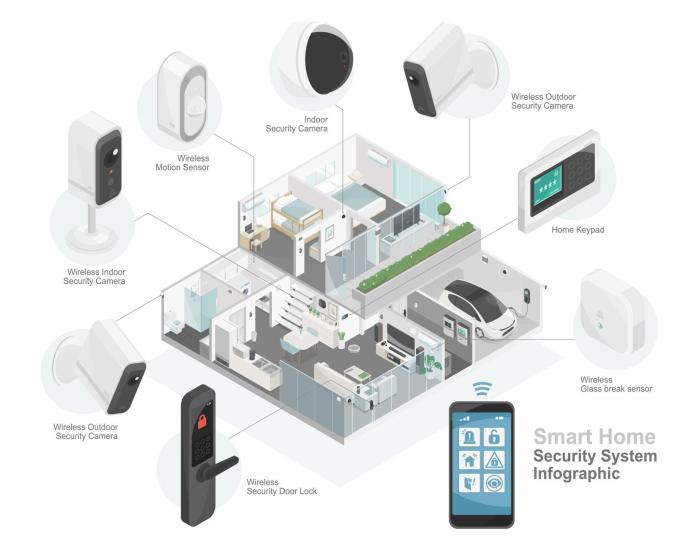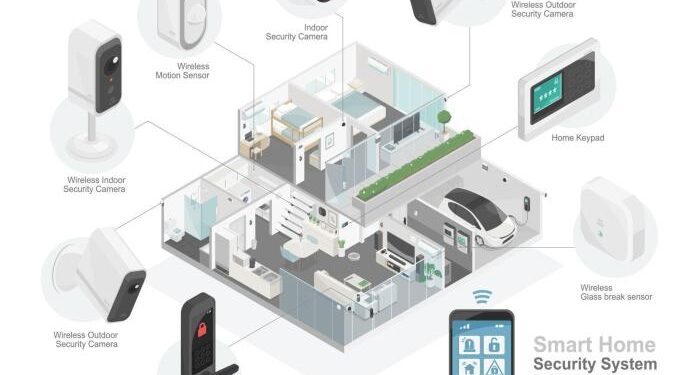Exploring the realm of selecting the optimal smart home system with top-notch security features, this introduction sets the stage for an enlightening journey. It delves into crucial aspects to consider when safeguarding your home with modern technology.
Providing valuable insights on security cameras, smart locks, access control, and alarm systems, this guide aims to empower you in making informed decisions for a secure living environment.
Factors to Consider
When choosing a smart home system with security features, there are several factors to consider to ensure you select the best option for your needs.
Important Security Features
- Video surveillance cameras with high-resolution and night vision capabilities.
- Motion sensors to detect any unusual activity in and around your home.
- Door and window sensors for monitoring unauthorized entry.
- Remote access and control through a smartphone app for real-time monitoring.
- An alarm system that can alert you and authorities in case of emergencies.
Impact of Home Size
The size of your home can impact the choice of security features you need. Larger homes may require more cameras and sensors to provide comprehensive coverage, while smaller homes may need fewer devices.
Compatibility with Smart Devices
It is essential to consider the compatibility of the smart home security system with other smart devices you may already have or plan to integrate in the future. This ensures seamless connectivity and control over all your devices from one central hub.
Wired vs. Wireless Systems
When deciding between wired and wireless security systems for smart homes, consider the ease of installation, flexibility, and reliability of each option. Wireless systems are often easier to install and can be more flexible in terms of placement, while wired systems may offer more reliability and stability in connectivity.
Types of Security Cameras

When setting up a smart home system with security features, choosing the right security cameras is crucial. There are different types of security cameras available, each with its own set of features and capabilities.
Different Types of Security Cameras
- Indoor Cameras: These cameras are designed for indoor use and are typically smaller and more discreet. They are ideal for monitoring the inside of your home, such as living rooms, bedrooms, or hallways.
- Outdoor Cameras: Outdoor cameras are built to withstand various weather conditions and are usually larger and more durable. They are perfect for monitoring the exterior of your home, such as the front yard, backyard, or driveway.
- PTZ Cameras: Pan-tilt-zoom cameras offer the flexibility to pan, tilt, and zoom to get a better view of specific areas. They are great for large outdoor spaces or areas that require close monitoring.
- Dome Cameras: Dome cameras are typically mounted on the ceiling and offer a 360-degree view of the surroundings. They are suitable for areas where you want to deter intruders discreetly.
Importance of Camera Resolution
Camera resolution plays a crucial role in capturing clear video footage. Higher resolution cameras provide sharper images and better clarity, making it easier to identify faces or objects in the video feed.
Benefits of Night Vision Capability
Night vision capability in security cameras is essential for monitoring your home at night or in low-light conditions. It allows the cameras to capture clear footage even in the dark, providing round-the-clock security.
Comparison of Indoor and Outdoor Security Cameras
- Features: Outdoor cameras are designed to withstand outdoor elements like rain, snow, and extreme temperatures, while indoor cameras may not have the same level of durability.
- Installation: Outdoor cameras require weatherproof housing and proper mounting to ensure they are secure and functioning correctly, whereas indoor cameras can be placed on shelves or mounted on walls without the need for weatherproofing.
Smart Locks and Access Control
Smart locks play a crucial role in enhancing home security by providing advanced access control features that traditional locks cannot offer. These modern devices offer convenience, flexibility, and additional layers of protection to keep your home secure.
Benefits of Smart Locks
- Remote Access: Smart locks allow you to lock and unlock your doors from anywhere using your smartphone. This feature comes in handy when you need to grant access to visitors or service providers while you are away.
- Keyless Entry: With smart locks, you can say goodbye to traditional keys and easily enter your home using codes, fingerprints, or even your smartphone.
- Activity Monitoring: Many smart locks provide activity logs that allow you to track who enters and exits your home and at what time, providing an added layer of security and peace of mind.
Methods of Access Control
- Keypad Entry: Users can enter a unique code to unlock the door, eliminating the need for physical keys.
- Biometric Authentication: Some smart locks use fingerprint recognition technology to grant access to authorized users.
- Bluetooth/Wi-Fi Connectivity: Smart locks can be connected to your smartphone via Bluetooth or Wi-Fi for remote access and control.
Integration with Virtual Assistants
Smart locks can be integrated with virtual assistants like Alexa or Google Home, allowing you to control your locks using voice commands. This integration enhances security by providing seamless access control and monitoring capabilities.
Choosing the Right Smart Lock
- Connectivity: Ensure the smart lock you choose is compatible with your existing smart home system and offers secure connectivity options like Bluetooth or Wi-Fi.
- Security Protocols: Look for smart locks that use advanced encryption methods to protect your data and prevent unauthorized access.
- User-Friendly Features: Consider smart locks with features like geofencing, guest access codes, and activity alerts for added convenience and security.
Alarm Systems and Monitoring
When it comes to smart home security, alarm systems play a crucial role in detecting and alerting homeowners of potential threats or intrusions. These systems are designed to provide an added layer of protection to keep your home and loved ones safe.
Professional Monitoring Services
Professional monitoring services are essential for security systems as they offer round-the-clock surveillance and immediate response in case of emergencies. These services ensure that authorities are alerted promptly in case of a security breach, providing peace of mind to homeowners.
DIY vs. Professionally Installed Systems
- DIY alarm systems are typically more budget-friendly and easier to install, making them a popular choice for homeowners looking for a simple security solution.
- Professionally installed systems, on the other hand, offer advanced features and seamless integration with other smart home devices. While they may come at a higher cost, the expertise and reliability they provide are unmatched.
Choosing the Best Alarm System
When selecting an alarm system for your home, consider factors such as the layout of your property, the level of security needed, and any specific requirements you may have. It's essential to choose a system that meets your unique security needs and provides the necessary protection for your home.
Summary
In conclusion, navigating the landscape of smart home security systems can be overwhelming, but armed with the right knowledge, you can confidently choose the best system tailored to your needs. Stay informed, stay secure.
Questions Often Asked
What security features should I prioritize when selecting a smart home system?
Focus on features like encrypted communication, motion detection, and secure login protocols for enhanced protection.
How does the size of my home influence the choice of security features in a smart home system?
A larger home may require more cameras for comprehensive coverage and potentially advanced monitoring capabilities.
What are the benefits of integrating smart locks with virtual assistants like Alexa or Google Home?
Integration allows for convenient voice-controlled access and monitoring of your home's security status.
Why is professional monitoring important for alarm systems in a smart home setup?
Professional monitoring ensures immediate response to security threats, providing peace of mind and round-the-clock protection.



